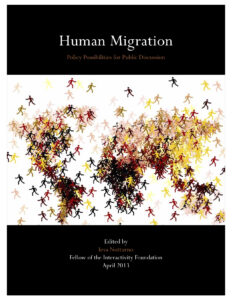Just Imagine…Enabling Everyone to Be a Star
Steven Chen was born in Taiwan in 1978 and immigrated to the U.S. with his family in 1985. He studied Computer Science at the University of Illinois. He worked for...
Migration strikes at the very core of what it  means to be “American,” for our history is a story of human migrations. It includes the original migrations of native Americans, the much later migration of the Pilgrims, the colonization process, the slave trade, the waves upon waves of European and Asian immigrants to the United States, ongoing in de-ustrialization, urbanization, suburbanization, the seasonal movements of laborers and retirees, migration due to globalization and natural disasters such as Katrina, and the emigration of Americans to other countries. Recent developments in communication, manufacturing, information technology, and transportation has only made human migration easier, more affordable, and more frequent. But regardless of whether we move close or far, human migration affects us on many different levels. It raises a large number of public policy questions and concerns about the effects that human migration might have upon individuals, groups, institutions, and society at large.This discussion guide, and the six policy possibilities, it presents invites us to explore and consider many foundational questions and concerns about migration and what it means for our society and our future, including exploring the forces that drive migration, how migration and the conflicts that arise from it shape democracy, and how migration-fueled conflicts can be used or exploited for political ends.
means to be “American,” for our history is a story of human migrations. It includes the original migrations of native Americans, the much later migration of the Pilgrims, the colonization process, the slave trade, the waves upon waves of European and Asian immigrants to the United States, ongoing in de-ustrialization, urbanization, suburbanization, the seasonal movements of laborers and retirees, migration due to globalization and natural disasters such as Katrina, and the emigration of Americans to other countries. Recent developments in communication, manufacturing, information technology, and transportation has only made human migration easier, more affordable, and more frequent. But regardless of whether we move close or far, human migration affects us on many different levels. It raises a large number of public policy questions and concerns about the effects that human migration might have upon individuals, groups, institutions, and society at large.This discussion guide, and the six policy possibilities, it presents invites us to explore and consider many foundational questions and concerns about migration and what it means for our society and our future, including exploring the forces that drive migration, how migration and the conflicts that arise from it shape democracy, and how migration-fueled conflicts can be used or exploited for political ends.